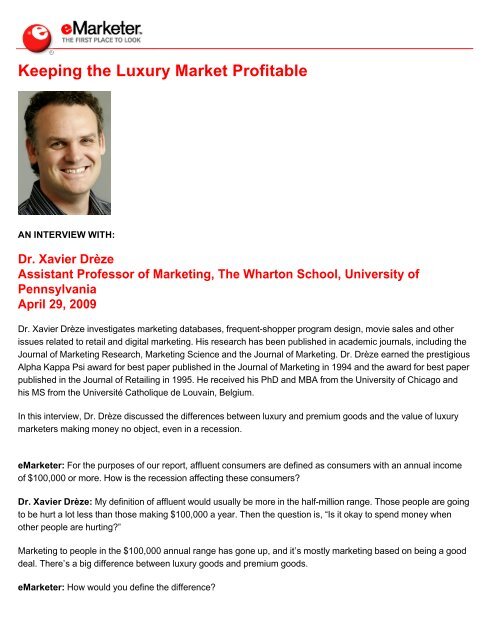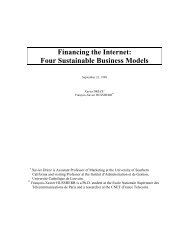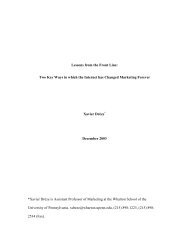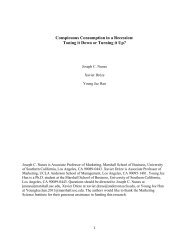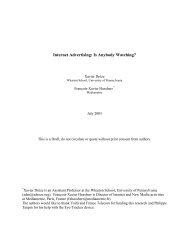Keeping the Luxury Market Profitable - Xavier Drèze
Keeping the Luxury Market Profitable - Xavier Drèze
Keeping the Luxury Market Profitable - Xavier Drèze
You also want an ePaper? Increase the reach of your titles
YUMPU automatically turns print PDFs into web optimized ePapers that Google loves.
<strong>Keeping</strong> <strong>the</strong> <strong>Luxury</strong> <strong>Market</strong> <strong>Profitable</strong><br />
AN INTERVIEW WITH:<br />
Dr. <strong>Xavier</strong> <strong>Drèze</strong><br />
Assistant Professor of <strong>Market</strong>ing, The Wharton School, University of<br />
Pennsylvania<br />
April 29, 2009<br />
Dr. <strong>Xavier</strong> <strong>Drèze</strong> investigates marketing databases, frequent-shopper program design, movie sales and o<strong>the</strong>r<br />
issues related to retail and digital marketing. His research has been published in academic journals, including <strong>the</strong><br />
Journal of <strong>Market</strong>ing Research, <strong>Market</strong>ing Science and <strong>the</strong> Journal of <strong>Market</strong>ing. Dr. <strong>Drèze</strong> earned <strong>the</strong> prestigious<br />
Alpha Kappa Psi award for best paper published in <strong>the</strong> Journal of <strong>Market</strong>ing in 1994 and <strong>the</strong> award for best paper<br />
published in <strong>the</strong> Journal of Retailing in 1995. He received his PhD and MBA from <strong>the</strong> University of Chicago and<br />
his MS from <strong>the</strong> Université Catholique de Louvain, Belgium.<br />
In this interview, Dr. <strong>Drèze</strong> discussed <strong>the</strong> differences between luxury and premium goods and <strong>the</strong> value of luxury<br />
marketers making money no object, even in a recession.<br />
e<strong>Market</strong>er: For <strong>the</strong> purposes of our report, affluent consumers are defined as consumers with an annual income<br />
of $100,000 or more. How is <strong>the</strong> recession affecting <strong>the</strong>se consumers?<br />
Dr. <strong>Xavier</strong> <strong>Drèze</strong>: My definition of affluent would usually be more in <strong>the</strong> half-million range. Those people are going<br />
to be hurt a lot less than those making $100,000 a year. Then <strong>the</strong> question is, “Is it okay to spend money when<br />
o<strong>the</strong>r people are hurting?”<br />
<strong>Market</strong>ing to people in <strong>the</strong> $100,000 annual range has gone up, and it’s mostly marketing based on being a good<br />
deal. There’s a big difference between luxury goods and premium goods.<br />
e<strong>Market</strong>er: How would you define <strong>the</strong> difference?
“Premium products, like Lexus or BMW, are going for performance, and <strong>the</strong>y’re<br />
always going to position it as a great value…<strong>Luxury</strong> marketers don’t talk about<br />
price…It’s about quality and service.”<br />
Dr. <strong>Drèze</strong>: Premium products, like Lexus or BMW, are going for performance, and <strong>the</strong>y’re always going to<br />
position it as a great value. The Lexus people will tell you, “You can’t buy a car like this for cheaper.” <strong>Luxury</strong><br />
marketers don’t talk about price. You don’t buy a Rolls-Royce because it’s a good value. It’s about quality and<br />
service.<br />
A lot of <strong>the</strong> brands that a common person would consider luxury are not real luxury. People don’t know of a lot of<br />
<strong>the</strong> real luxury brands—it’s an insider game. As you get into <strong>the</strong> market, you learn about new brands you didn’t<br />
know existed.<br />
e<strong>Market</strong>er: So which brands are more affected by <strong>the</strong> recession?<br />
Dr. <strong>Drèze</strong>: Premium brands are affected more than luxury brands, because price is part of <strong>the</strong>ir communication<br />
and selling point. I see a lot more push by those brands to convince consumers it’s a good time to buy. Brands like<br />
Tumi are doing a lot of e-mail marketing now advertising sales. You see <strong>the</strong> same thing even with West Marine, a<br />
big sailing superstore.<br />
You don’t see that from <strong>the</strong> real luxury brands, but <strong>the</strong>y also use e-mail marketing. Louis Vuitton will send you stuff,<br />
but it’s never, “This is a great deal.” It’s all about, “This is a great product.”<br />
e<strong>Market</strong>er: Is a luxury brand that starts talking about value demoting itself to a premium brand?<br />
Dr. <strong>Drèze</strong>: Yes. A lot of luxury brands, like Louis Vuitton, will sell scarves, belts and key chains that are affordable<br />
to a lot of people, but <strong>the</strong>y’re never pushing those.<br />
e<strong>Market</strong>er: Just like Tiffany & Co. and <strong>the</strong> smaller sterling silver items it sells. No one wants to say, “You can get<br />
this great keychain here.” They want to sell engagement rings.<br />
Dr. <strong>Drèze</strong>: Right, and <strong>the</strong>y put a very strict limit on how many keychains <strong>the</strong>y sell, because <strong>the</strong>y don’t want<br />
everybody to have a Tiffany keychain. They want to use those products as an entry product into <strong>the</strong> line, so <strong>the</strong>y’re<br />
going to limit <strong>the</strong> amount of products.<br />
There’s a big risk for a luxury brands letting in <strong>the</strong> masses. You’re trying to build a relationship with someone who’s<br />
going to come back. The wrong consumers might buy a premium item that’s on sale. Five years later, when <strong>the</strong>y’re<br />
going to replace it, it’s not going to be on sale and <strong>the</strong>y’ll go back to ano<strong>the</strong>r brand. <strong>Luxury</strong> brands want consumers<br />
who will still be <strong>the</strong>re when <strong>the</strong> economy gets back to normal.<br />
BMW, as a premium brand, is playing a volume game. They want to sell a lot of cars. Ferrari, in contrast, is<br />
artificially creating scarcity. If you want a new one, <strong>the</strong>re’s a two-year waiting list. That also means <strong>the</strong>y’re going to<br />
be less hit, because in <strong>the</strong> recession, <strong>the</strong> waiting list goes from two years to maybe a year and six months. But<br />
<strong>the</strong>re’s still a waiting list, so <strong>the</strong>y don’t need to lower <strong>the</strong> price.<br />
e<strong>Market</strong>er: Are affluent consumers doing more research before making purchases now?<br />
“Rich doesn’t mean that you waste money. The affluent are <strong>the</strong> biggest deal
seekers…They negotiate with a brand store or buy from a reseller, where <strong>the</strong>y<br />
can get 20% or 30% off.”<br />
Dr. <strong>Drèze</strong>: Yes. Rich doesn’t mean that you waste money. The affluent are <strong>the</strong> biggest deal seekers. They’re used<br />
to buying really expensive stuff, and a lot of what <strong>the</strong>y buy doesn’t sell that much. The average high-end watch stays<br />
in <strong>the</strong> store for a year and a half. They don’t sell 58 a day. They sell 20 a month or a year. Many affluent consumers<br />
don’t pay retail value. They negotiate with a brand store or buy from a reseller, where <strong>the</strong>y can get 20% or 30% off.<br />
e<strong>Market</strong>er: Let’s go back to e-mail marketing.<br />
Dr. <strong>Drèze</strong>: Many of <strong>the</strong> luxury brands do e-mail marketing and it’s good, especially now, because as <strong>the</strong> customer<br />
base shrinks, you want to re-target <strong>the</strong>m and e-mail is <strong>the</strong> best way to target. In <strong>the</strong> general population, not that<br />
many people are going to be responsive to luxury brands. <strong>Luxury</strong> brands are using e-mail to re-emphasize <strong>the</strong><br />
service aspect of what <strong>the</strong>y’re doing, saying to <strong>the</strong>ir target list, “We know you, we understand you and here is our<br />
number if you need to talk to us.”<br />
The true luxury goods usually control <strong>the</strong> order distribution points, so <strong>the</strong>ir own store and online experiences are<br />
consistent with <strong>the</strong> brand. User-friendly is not always what <strong>the</strong>y’re trying to go for. They’re not trying to make it easy<br />
for consumers to buy, because <strong>the</strong>y don’t want to give <strong>the</strong> impression that <strong>the</strong>y need you more than you need <strong>the</strong>m.<br />
If you go into a Ferrari store, <strong>the</strong>y may not even talk to you. You need to be recommended by somebody, and <strong>the</strong>y<br />
sell <strong>the</strong>ir cars first to <strong>the</strong>ir current customers and <strong>the</strong>n rank order o<strong>the</strong>r customers. There’s a whole process of<br />
being vetted by <strong>the</strong> marque in order to buy it. That makes <strong>the</strong>m more recession-proof because <strong>the</strong>y can just go to<br />
<strong>the</strong>ir client list.<br />
e<strong>Market</strong>er: With luxury brands, personalization is a big part of <strong>the</strong> service.<br />
Dr. <strong>Drèze</strong>: Yes. During <strong>the</strong> recession, it’s not about dropping <strong>the</strong> price. It’s about personalized service. You see<br />
that with airlines. Frequent fliers are treated really well during a recession.<br />
<strong>Luxury</strong> good manufacturers have always done custom products, but <strong>the</strong>y don’t always make money on it. Some of<br />
it’s a customer-retention policy for <strong>the</strong> really good customers, not just anyone. In <strong>the</strong> recession, <strong>the</strong>y’re a little more<br />
careful.<br />
e<strong>Market</strong>er: Is marketing luxury brands to aspirational consumers as important during <strong>the</strong> recession?<br />
Dr. <strong>Drèze</strong>: Yes. When you go down <strong>the</strong> street in an expensive car, people look at you with envy, and that’s part of<br />
<strong>the</strong> product experience. It’s very possible that Chanel will advertise on a billboard in Times Square, not to try to sell<br />
an ordinary person clothing or perfume, but to make sure that when that person sees somebody in a Chanel dress,<br />
<strong>the</strong>y know it’s Chanel.<br />
“You see Lamborghini ads in Delhi or China where <strong>the</strong> roads can’t even handle<br />
<strong>the</strong> car yet. It’s seeding <strong>the</strong> brand in <strong>the</strong> mind of people, getting <strong>the</strong>m to dream<br />
about <strong>the</strong> product.”<br />
You see Lamborghini ads in Delhi or China where <strong>the</strong> roads can’t even handle <strong>the</strong> car yet. It’s seeding <strong>the</strong> brand in<br />
<strong>the</strong> mind of people, getting <strong>the</strong>m to dream about <strong>the</strong> product. They may not make money now, but it’s a long-term
game.<br />
e<strong>Market</strong>er: What luxury brands are doing really well now?<br />
Dr. <strong>Drèze</strong>: Lamborghini seriously upped its game. They’ve become a critical high-end exotic sports car<br />
manufacturer, instead of just being outrageous. Louis Vuitton is doing well. The Swatch Group owns Swatch and<br />
now something like 50% of <strong>the</strong> high-end watchmakers. They’ve been really good at reviving <strong>the</strong> brands, investing<br />
money in and really capitalizing on <strong>the</strong>ir history.<br />
e<strong>Market</strong>er: What luxury brands aren’t doing well?<br />
Dr. <strong>Drèze</strong>: If everybody is buying <strong>the</strong> luxury brand, <strong>the</strong>n that brand is in trouble. That’s what happened to Burberry.<br />
In England, <strong>the</strong>re are a bunch of low-end products, like a cap or scarf. Lower-class young people <strong>the</strong>y call “chavs”<br />
were starting to wear <strong>the</strong> brand, and you could go down <strong>the</strong> street and see everybody with that recognizable<br />
pattern.<br />
<strong>Luxury</strong> brands need to make it difficult for people to buy <strong>the</strong>m. They need to create that desire, that dream that’s<br />
never about price. That’s what insulates <strong>the</strong>m in <strong>the</strong> recession.<br />
©2009 e<strong>Market</strong>er Inc. All rights reserved


